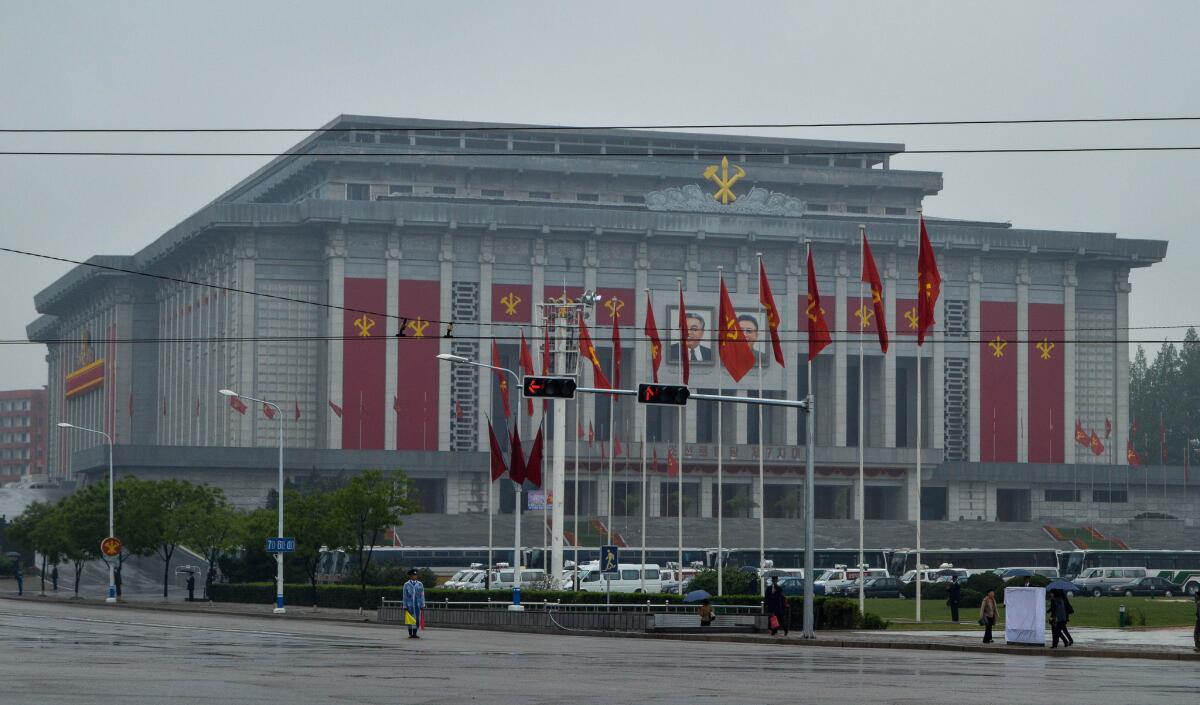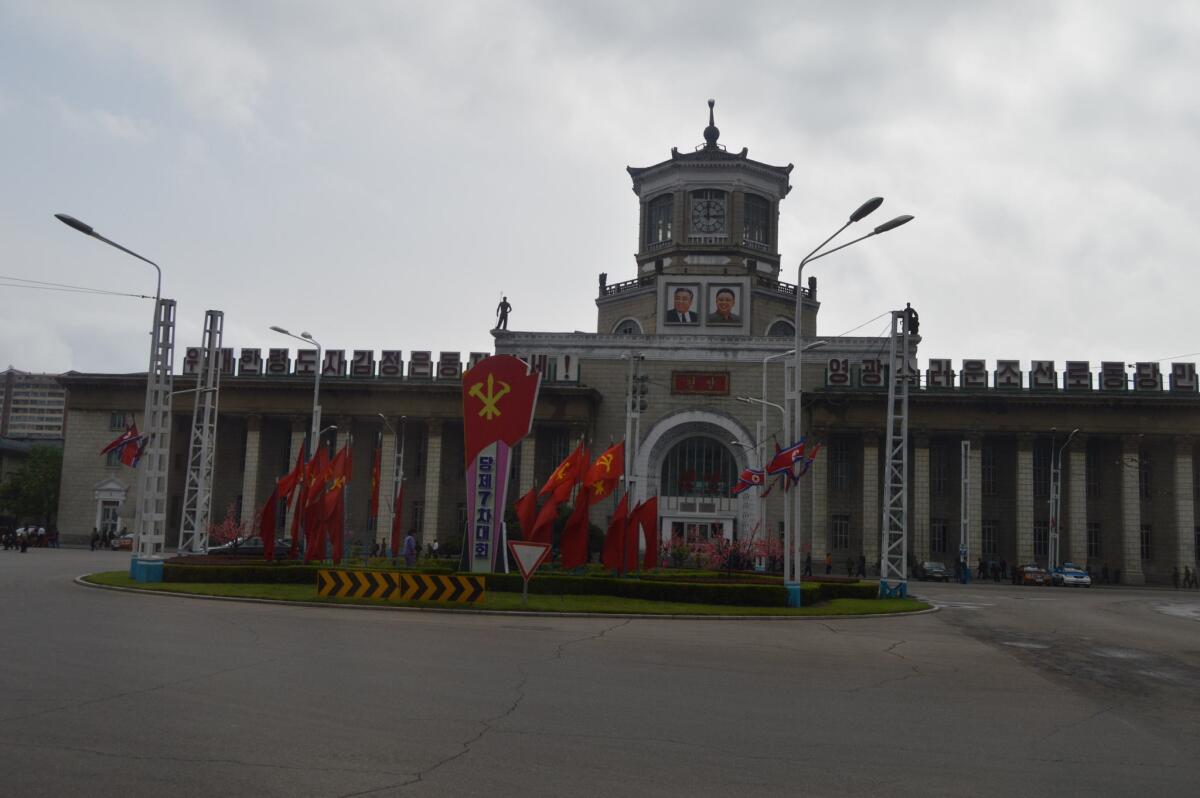Kim Jong Un, hailing hydrogen bomb test and satellite launch, predicts ‘final victory’

The North Korean Workers’ Party Congress is being held in the April 25 House of Culture, seen on May 6, 2016.
- Share via
Reporting from Pyongyang, North Korea — Opening North Korea’s first ruling Workers’ Party Congress in 36 years, leader Kim Jong Un on Friday hailed the country’s recent hydrogen bomb test and satellite launch as “unprecedented” achievements that will lead the isolated and impoverished nation of 24 million to “final victory.”
Dressed in a black pinstripe suit with his hair slicked back, Kim entered the April 25 House of Culture in the capital, Pyongyang, to thunderous applause and cheers from 3,467 delegates and an additional 1,387 observers, some of whom appeared to be weeping.
The congress is the highest-level political meeting in North Korea, and Kim’s convening of the gathering after such a long interval -- his father, Kim Jong Il, never held one at all during his 17-year rule -- has raised expectations inside and outside North Korea that the young leader may announce some new major policy direction or personnel changes.
INSIDE NORTH KOREA: Full coverage
No major revelations were forthcoming at the Friday opener, and it was unclear how many days the congress would last. Though the meeting got underway Friday morning, no news of the proceedings was released until a special broadcast aired on the state-run news channel around 10 p.m. local time.
More than 100 foreign journalists who were granted visas to the country this week to cover the event were kept outside the venue and were not briefed on the happenings inside. In a move that would be considered bizarre in most any other country besides North Korea, government handlers schlepped the foreign reporters to tour a wire-making factory in the afternoon, keeping them far away from the congress venue.

Two students chat outside the North Korea Party Congress.
Speaking from a sheath of notes from behind a lectern, a bespectacled Kim devoted a portion of his remarks to looking back on the trials and tribulations North Korea has endured since the last congress in 1980, including sanctions, isolation, the collapse of the Soviet bloc and other hardships. But, he insisted, North Koreans had persevered and prevailed by rallying around his grandfather, Kim Il Sung, and then his father, and now he himself.
The development of nuclear weapons and missile technology, he said, had assured North Korea’s security and place in the world, guaranteeing that a small country like itself won’t be intimidated by powerful nations such as the United States.
Kim then outlined a five-point agenda for the coming days that included revisions to the party bylaws, election of the central leadership organ, and a review of central committee and army committee work reports. The gathering will also bestow Kim with the title of supreme leader of the party (he is currently first secretary).
Military officials with their chests covered in medals and Workers’ Party delegates in dark suits gave Kim round after round of standing ovations and occasionally broke into cheers as the gathering got underway, images from North Korean state TV showed.
The broadcast ended a long day of waiting for news by both ordinary North Koreans and the international media. Throughout the day, state-run TV broadcast some “special programming” for the congress, but none of it was live. After some images of military orchestras, the station later played clips of old North Korean films. Until well in the evening, there were no details about what had transpired inside the April 25 House of Culture, which was draped in red flags and party banners.
As a light drizzle fell Friday morning, government-provided buses and vans drove more than 100 foreign journalists to an intersection in front of the April 25 House of Culture, raising hopes among reporters that they might be allowed to go inside to witness the proceedings. Instead, government minders permitted the journalists a rare opportunity to conduct man-on-the-street interviews with passersby, then drove them back to the designated hotel where they all must stay.
Many of those interviewed professed excitement about the congress, which has been the subject of a massive propaganda buildup over the last 70 days, but no one had the faintest idea what would happen at the gathering, who exactly was attending, or even how long it would last.
“We don’t know what will happen,” said Song Jong Min, a university student. His friend, surnamed Joo, added: “We are sure that respected Marshal Kim Jong Un will indicate the way; where we are going to. And our country will be a greater country.”
The congress, which gathers delegates from across the country and is the highest-level gathering in North Korea’s political system, is apparently intended to highlight national unity and stability under Kim, who came to power in late 2011 after the death of his father, Kim Jong Il.
The entire country was mobilized to “speed up production” for 70 days leading up to the congress, and the North’s state-controlled media were full of breathless reports about allegedly miraculous accomplishments at cement plants and coal mines, as well as the construction of a new power plant.
Pyongyang was decked out with red flags and new propaganda banners on nearly every street in the center of the city of 2.5 million. Residents were mobilized to rehearse for parades and a torchlight procession, among other events, to mark the congress, though guides seemed to have no information about when those events would happen either.
NEWSLETTER: Get the day’s top headlines from Times Editor Davan Maharaj >>
Kim Jong Un, who is in his early 30s, has spent the last several years sprucing up the capital, constructing new residential skyscrapers, a science center and theaters. He built a dolphinarium, a water park and a ski resort as well.
Though the economy remains overwhelmingly state-run, growth has picked up, thanks largely to trade with China and some loosening of restrictions on market-style enterprises. Pyongyang has noticeably more traffic -- and a more stable supply of electricity -- than a few years ago. But those gains now may be in jeopardy.
Kim drew the ire of the international community by reportedly testing a hydrogen bomb in January, and following that up with repeated missile launches and the launch of a satellite into low-Earth orbit. In March, the U.N. Security Council voted to impose new sanctions on North Korea.

Flags and propaganda signs decorate a roundabout in front of Pyongyang Station on May 6, 2016.
Ri Myong Hye, a 53-year-old tailor, said the country had lived under sanctions for years and would not be cowed.
“Despite all that, for the 7th Party Congress, the entire country, all our people have come out running, and put in great effort for a day like today,” she said. “Going forward, we will channel the joy of this 7th Congress to become energized and forge ahead.”
Park Chang Hwa, a 50-year-old construction worker, said Kim Jong Un had brought people many new amenities.
“In one to two years, we’ve established an indoor pool, a great study hall, kindergartens and nursing homes all around, and tall socialist buildings that no one else can imitate or speak of,” she said. “And tall buildings, college buildings for the students of Kim Il Sung University and upscale homes for scientists and technicians.”
Echoing one of North Korea’s most familiar propaganda lines, she added: “Our people live without an envy in the world.”
Kim remains an enigma to much of the world. Despite having been educated in Switzerland, he has not traveled abroad since coming to power, nor has he received a foreign head of state (though he has invited celebrities such as Dennis Rodman into the country).
But North Koreans already regard Kim as a much less remote figure than his father, who had a reputation for reclusiveness and eccentricity.
Although Kim Jong Il led North Korea from 1994 to 2011, he never gave a public speech, and many North Koreans can recall hearing his voice just once, at a military parade in the 1990s.
Kim Jong Un, in contrast, has already delivered several public speeches in his four-year tenure.
“We’ve heard his voice three or four times already,” noted Hwang Myong Sim, a minder accompanying foreign journalists this week.
Foreign analysts have speculated that the congress might be an opportunity for Kim to lay out further details of his vision for the country’s future, including how he plans to advance his policy of developing nuclear weapons and bolstering the economy at the same time. That is seen as unfeasible by many outside observers if the recent U.N. sanctions are thoroughly implemented.
But Adam Cathcart, a lecturer in history and a North Korea watcher at Leeds University, said for Kim, the congress may be more backward-looking in a way, to the legacy of his father as well as his grandfather, North Korea’s founder Kim Il Sung.
“While the North Koreans seem intent on rhetorically celebrating the increasingly developed nuclear deterrent in these proceedings, and outside observers look for any minute signs of new political liberalization, as important is the connection Kim Jong Un makes with the past,” Cathcart said.
“Succession themes will be omnipresent, from evocations of “Kimilsongism-Kimjongilism” to new twin statues of the dead leaders physically placing the new Kim as the only possible executor of their now-monolithic legacy.”
Though the congress has started more with a whimper than a bang, Cathcart said the next few days may provide more pomp and circumstance that’s visible to the local populace and the world.
“The politics of spectacle are alive and well in North Korea,” he said, “and Kim Jong Un seems as intent as his father before him on the production of political theatricality.”
Special correspondent Steven Borowiec in Seoul contributed to this report.
Follow @JulieMakLAT for news from China
MORE FROM NORTH KOREA
A North Korean farm may not be what it appears
At a North Korean nursery school, tots get an early education in weaponry
Inside North Korea’s Children’s Palace, a reporter finds children turning into robotic grown-ups
More to Read
Sign up for Essential California
The most important California stories and recommendations in your inbox every morning.
You may occasionally receive promotional content from the Los Angeles Times.











